QUT students who are part of the changing face of university motorsport technology have debuted an electric car and driverless car at the Formula SAE-A in Melbourne over the weekend.
The Formula SAE-A is the annual Australasian competition of the SAE International movement and challenges student teams to design a small Formula-style race car that is judged on and off the track.
About 50 students are involved in QUT Motorsport, and 37 travelled to Melbourne for the 2023 national student competition from December 14 to 17 at Calder Park Raceway.
They transported two cars to Victoria – their new QEV-4 electric race car and their QEV-3D driverless vehicle.
The event marked an important milestone for QUT Motorsport, as it was the first time the team had an electric vehicle make it to the competition track to compete in the FSAE-A's dynamic events.
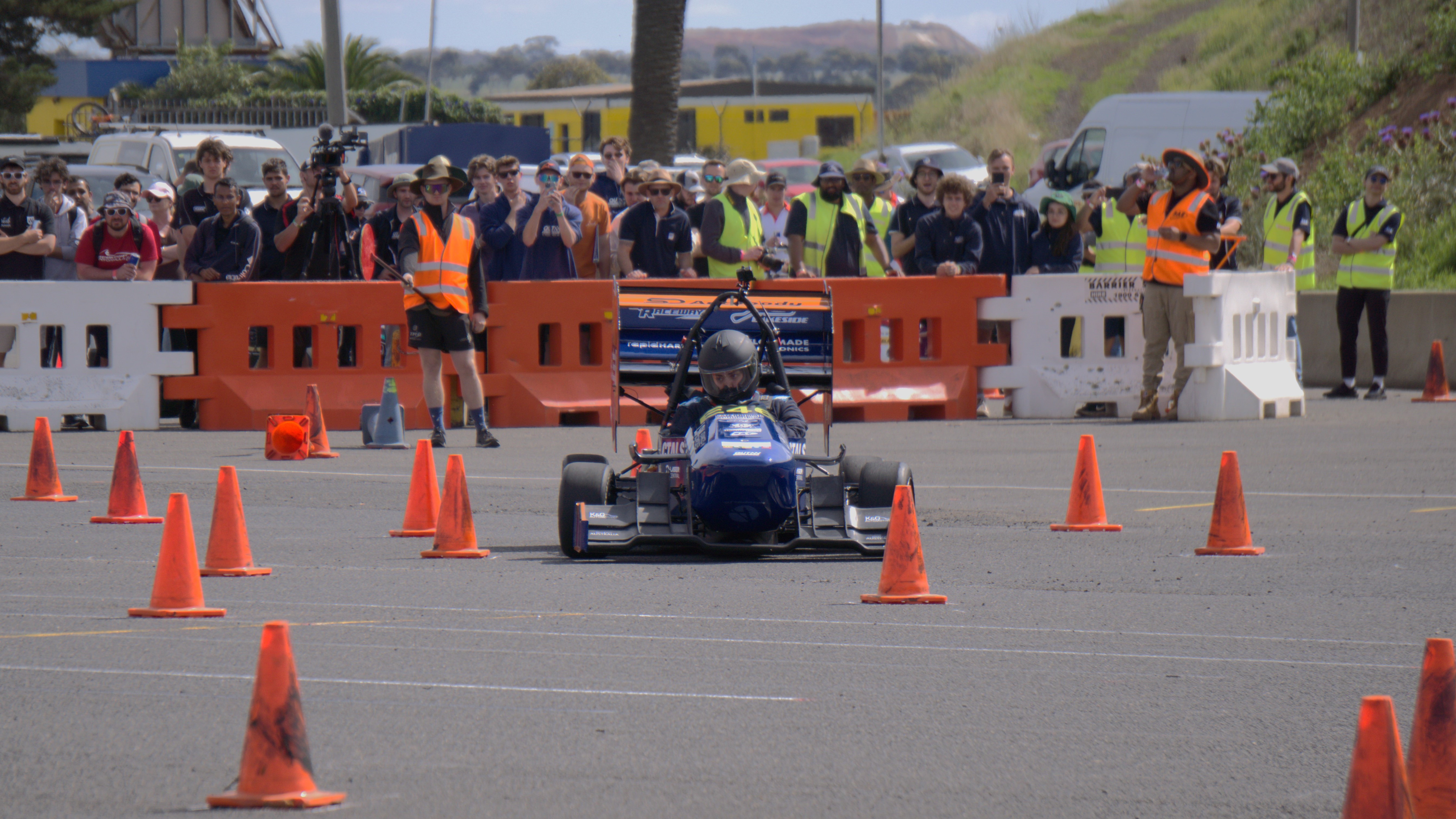
QEV-4's best results across the competition were a seventh placing in the skidpad event and a ninth place for design. QEV-3D was also on show in Melbourne, but did not complete the autonomous demonstration.
QUT Student Engagement supported the Melbourne trip by providing a grant to cover the students' accommodation and car hire while in the Victorian capital.
Aqua Cahalan is QUT Motorsport's vice principal and a mechanical engineering student who was selected for the FIA Girls on Track program at the 2023 Australian Formula One Grand Prix.
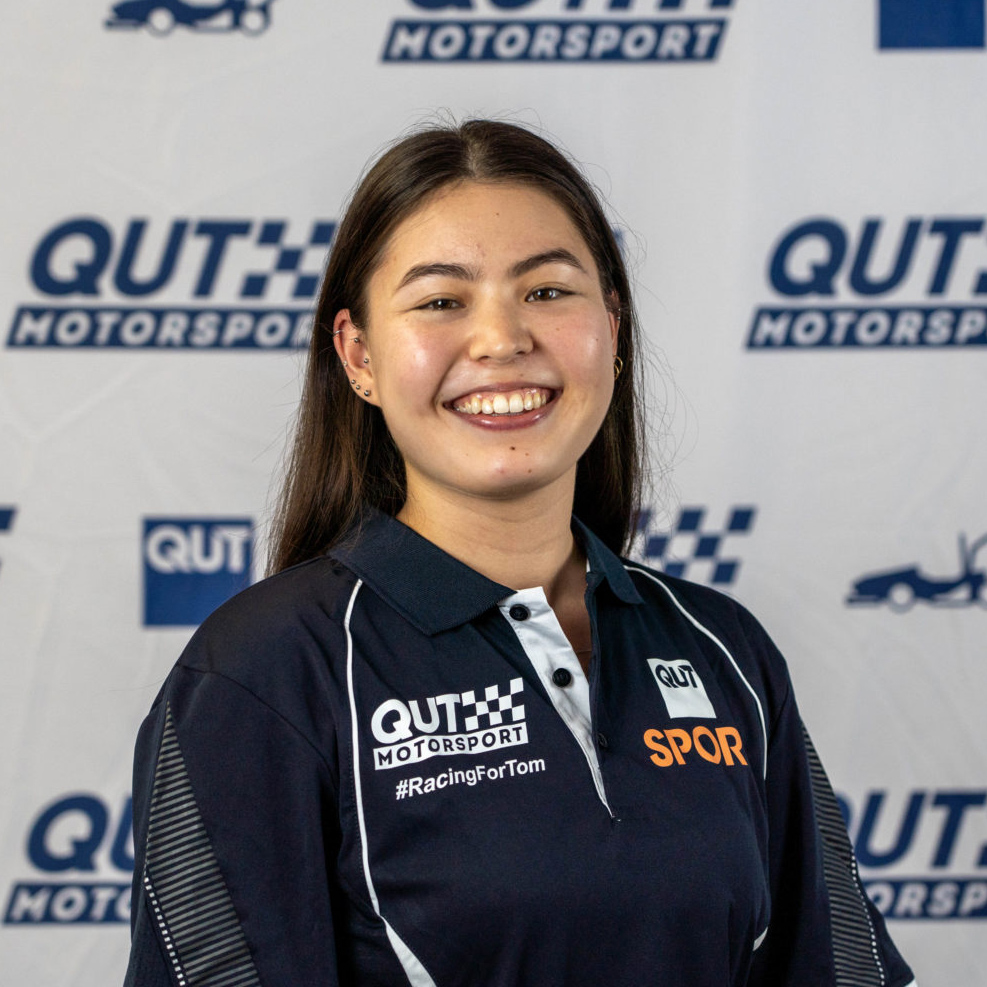
"QUT Motorsport started in 2004 and made the transition from combustion to electric vehicle (EV) design around 2014, but this was the first time that we had an electric race car actually compete on the FSAE-A track in the dynamic events of the competition," she said.
"There are still other teams in FSAE-A that compete with internal combustion (IC) vehicles, however the largest and most competitive category by far nowadays is the EV competition. This challenges members to innovate in the renewable space, work with complex electromechanical drivetrains, and strive to perform in more competitive categories at levels closer to the European Formula Student competitions.
"There is also an increasing number of teams in the autonomous vehicles category, but it isn't a scored category at the Australasian FSAE competition quite yet."
Miguel Costa Teixeira is the team's business manager and a double degree student studying engineering and business.
"Our electric race car, QEV-4, boasts some of the most advanced technology and specs that QUT Motorsport has ever produced in its history," he said.
"The car weighs in at 205kg, which is 30kg less than QEV-3D, but it's slightly bigger at 2.8m long and 1.5m wide.
"It's powered by two German-made Electric Fisher Motors mounted in each rear hub, which deliver more torque per ton than a Formula 1 car thanks to our custom-designed and manufactured stepped compound planetary gearboxes.
"The car features fully custom student designed and manufactured parts such as our aerodynamics package, software and telemetry suites and electronics.
"In theory, QEV-4 is geared to hit 110km/h, but with the nature of tracks that we race at competition, we are unlikely to see this speed."
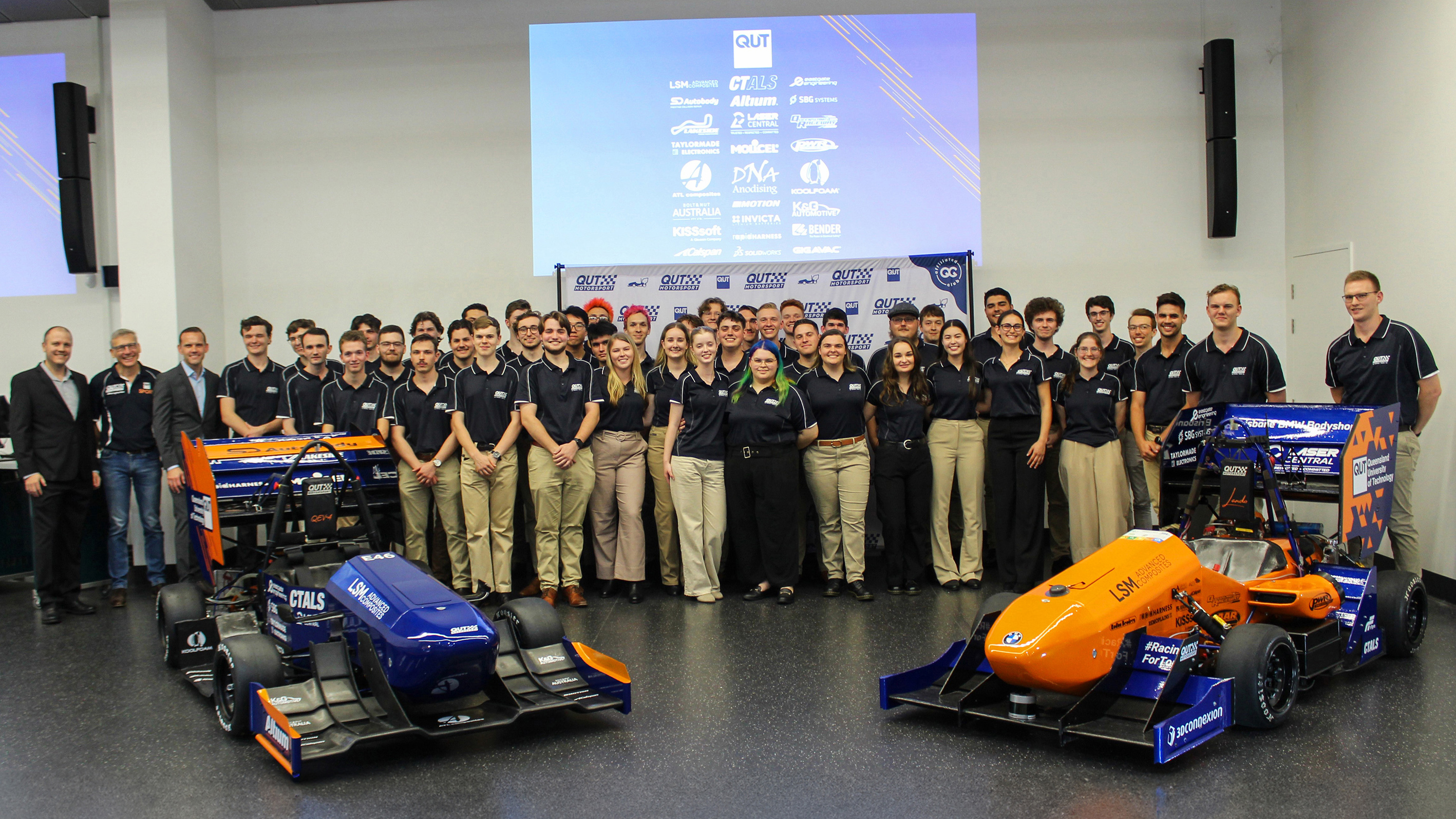
QEV-4 has been a three-year labour of love, with initial designs done in 2021, the chassis manufactured in 2022 and parts manufactured and assembled on to the vehicle in 2023.
It's very much a hands-on project for the students, with the majority of design and construction work done on campus at QUT. Track tests are performed at venues including Lakeside Park in Kurwongbah, Queensland Raceway and Ipswich Kart Club at Willowbank.
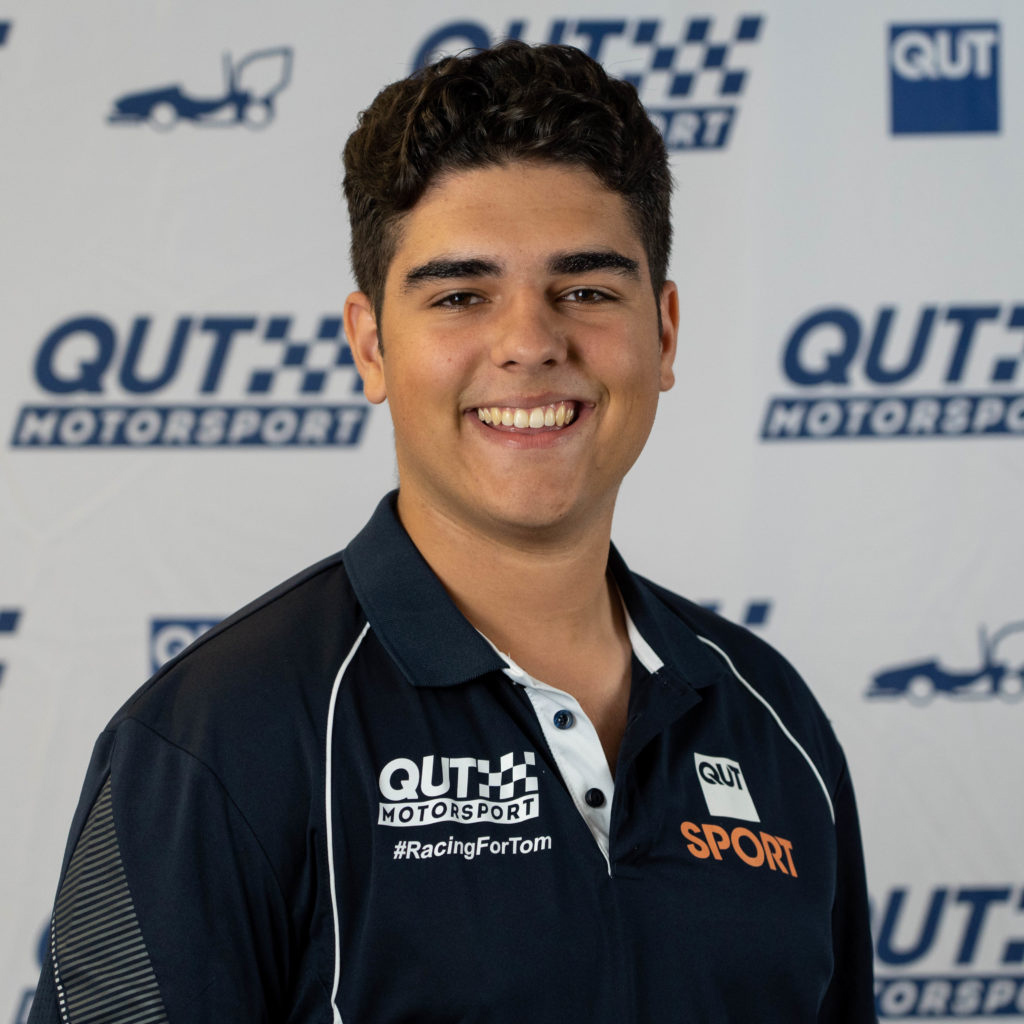
"The Gardens Point campus on-site fabrication facility, DeFab, and the J Block facilities have been instrumental in allowing us to build our vehicle alongside our own dedicated lab space, which we are extremely fortunate to have," Miguel said.
"We outsource fabrication for our extremely technical and advanced parts, such as our gearboxes, uprights and hubs, but other parts on our car such as our cooling jackets, most of our waterjet cut parts and any welding required all take place on campus."
The team's second car is its new driverless vehicle, QEV-3D. It was originally the 2020 electric race car and was retrofitted as an autonomous vehicle in 2022.
"QEV-3D is 2.7m long and 1.25m wide, it weighs about 230kg, and it's powered by four hub-mounted Plettenberg Nova Motors," Miguel said.
"It features a fully custom student made aerodynamics package, software and telemetry suite, electronics and, of course, all the additional sensors, cameras, actuators and computers required to run it in driverless specification."
QUT Motorsport is predominantly made up of undergraduate engineering students, but also has students studying business, design, science, IT, psychology, and other QUT degrees.
"We're always looking for new members and will have our next big intake at the beginning of next year," Aqua said.
"QUT Motorsport is open to students of any degree or major – there's always something to do and learn even if it doesn't directly relate to your studies.
"There's no limit on how many years a student can contribute for, so most members usually get hooked in their first year and end up sticking around until they graduate. By this time, they go on to become senior leadership and develop expertise in their chosen project areas.
"Our club also offers a four-week design camp internship opportunity to students at the beginning of each year from January to February. The club essentially turns into a full-time engineering firm during this time, allocating projects to members and facilitating great cross-collaboration between sub-teams. This is the period where we get the majority of our vehicle design work done, so it's a great time for interested students to get involved and receive Work Integrated Learning (WIL) hours credited towards their degrees."
Aqua said being involved in QUT Motorsport gave students an opportunity to apply their university studies to a real-world platform and engage with industry partners.
The FSAE-A also hosts a careers expo at each year's competition to enable students to connect with industry.
"Our members also engage with our industry partners all year, via visiting sites and facilities and learning from their expertise," Aqua said.
"We also hold an annual industry night to showcase our projects to our sponsors, supporters, and industry professionals, who often open up job opportunities for team members both during and after their studies.
"In the motorsport industry, we have alumni who are currently working in F1 and Supercars – and outside of the motorsport sphere, we have various alumni working in the space industry, Defence engineering, journalism, consulting, and much more.
"Our team also has connections with BMW Group Germany, through Volker Richter, the Head of Total Vehicle Technology and Quality Management, which has allowed for members to apply for internships in Germany. We currently have two QUT Motorsport students working for BMW Group in Germany!"
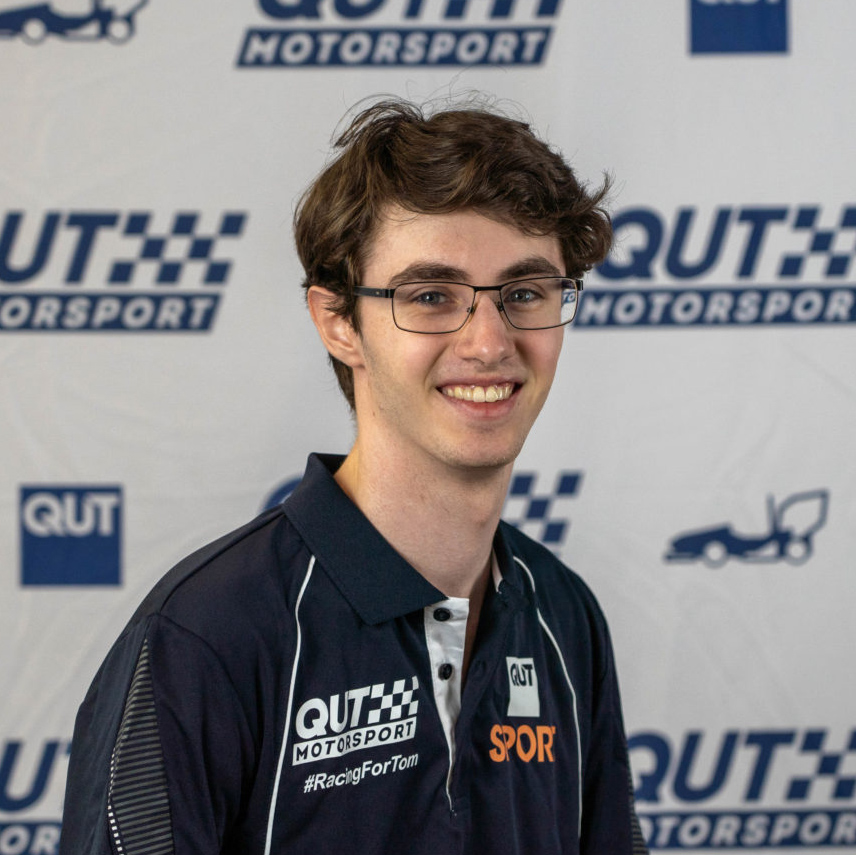
The team's driverless car manager, Alastair Bradford, is studying mechatronics engineering and said his three years with QUT Motorsport had given him practical skills that would help prepare him for his desired career in technology research and development.
"I joined QUT Motorsport for the challenge of a large engineering project that spanned longer than the projects I complete in classes," he said.
"Our team is structured across departments for various engineering, design, and business aspects, similar to real-world engineering workplaces, and we have to work with other disciplines to succeed.
"For me, it's the challenge of engineering an electric and autonomous vehicle from scratch each year and developing new state-of-the-art systems for them. It's exciting to see designs come to life and then show them off at our yearly competition after many hours of testing and validation."






